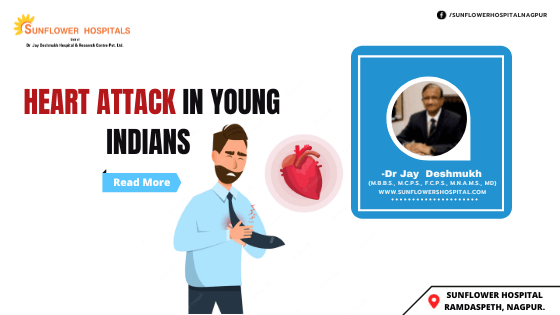What are common complaints related to a heart attack in the young population?
A sudden sense of suffocation or sudden exhaustion, unusual sweating, pain in the center of the chest, vomiting, and pain in the upper abdomen with sweating are the common symptoms that should not be ignored. Some individuals may have only dizziness and blackouts as the first symptom of a heart attack.
What are the common predisposing factors that lead to a heart attack in young Indians?
As per studies from Tamilnadu and Gujarat, 45% had Diabetes Mellitus, 48% had hypertension and 5.6% had high cholesterol levels. In a study from Karnataka, 90% were males, 60% were smokers, 14% had hypertension, 8.2% were diabetics, 65% had low HDL which is good cholesterol, 65% had abdominal obesity, and 32% had high triglycerides. If you had a combination of these, this certainly increased the risk of heart attacks in the young population.
What are the general risk factors attributable to heart attacks often neglected by the younger population?
Smoking, stress, alcohol, family history of heart attack, diabetes, hypertension, sedentary lifestyle, high cholesterol, and obesity are the common risk factors. However, some may have no risk factors. This is known as sudden cardiac arrest. Young people may die suddenly due to rhythm disturbances of the heart
What can the young population do to prevent cardiovascular disease and heart attacks?
Regular exercise is the key. A simple brisk walk for 45 minutes per day is essential. Heavy exercises at the gymnasium should be allowed only after proper medical examination. Avoiding smoking, tobacco chewing, and avoiding e-cigarettes is a must. Alcohol in excess is toxic to the heart. Maintaining a normal weight and restrictions on excess salt are important. Excess sugar
Imagine a young Indian male dying due to a heart attack leaving behind his young family. Scientists are not surprised. More cases are being seen in recent times. Untimely deaths of young Indians by heart attack are on the rise. This is sending shock waves across India. Since cardiovascular disease strikes Indians a decade earlier, a large number of heart attacks occur in the age group 30 and 69 years. or swelling of a heart muscle known as hypertrophic cardiomyopathy.
Can lifestyle changes result in heart attacks?
According to Dr. Aravind Kumar, the chief Cardiologist at Kauvery hospitals at Tiruchy, about 20% of his patients with heart attacks are below the age of 40 years. The major factor has been stress, particularly in the Corporate and IT industry. They work for their US clients from home with deprivation of sleep, long working hours, and with increased targets. and carbohydrates are as bad as smoking for the heart. Reducing screen time and spending time with your family and friends is a stress buster. Having periodic holidays, yoga and meditation should be a rule.
What about emotional or mental health?
Try to have a positive attitude, and keep some time of the day as a fun time. Avoid anxiety, stress, and depression as much as possible. Keep expectations from family members and employers and businesses at realistic levels. Things have changed since Covid and Ukraine time. You may take professional help if needed.
What are the investigations necessary on annual basis?
If you have a family history of diabetes and hypertension or high cholesterol or heart attack then annual evaluation should be from 20 years of age onwards. The tests include Fasting and Post meal blood glucose, total lipid profile, blood pressure measurement, and an electrocardiogram. The tests may vary in individual cases. Some may require stress ECG, CT angiogram, or coronary angiography.
Why young Indians are more prone than their western counterparts?
Indians have small circumference coronary arteries that make them vulnerable to occlusion, lack of awareness about the risk factors, inadequate health care facilities, increased smoking and alcohol, and poor recognition and treatment of silent diseases like diabetes, hypertension, and high cholesterol levels. Lack of exercise, abdominal obesity, and resultant metabolic syndrome make them more vulnerable. Heart attack in Indians is on the rise. This has become a major health concern. More people die due to heart disease, hypertension, and diabetes in India than Coronavirus infections. However general awareness of these diseases is lacking. This makes cardiovascular disorders in India more challenging to treat.
Author: Dr Jay Deshmukh
Dr Jay Deshmukh is Chief Physician and Director, Sunflower Hospital, Nagpur Honorary Physician to Honorable Governor of Maharashtra and PondicherryCentral. Dr Jay Deshmukh is an M.B.B.S., M.C.P.S., F.C.P.S., M.N.A.M.S., MD From Internal Medicine – Bombay and New Delhi.


